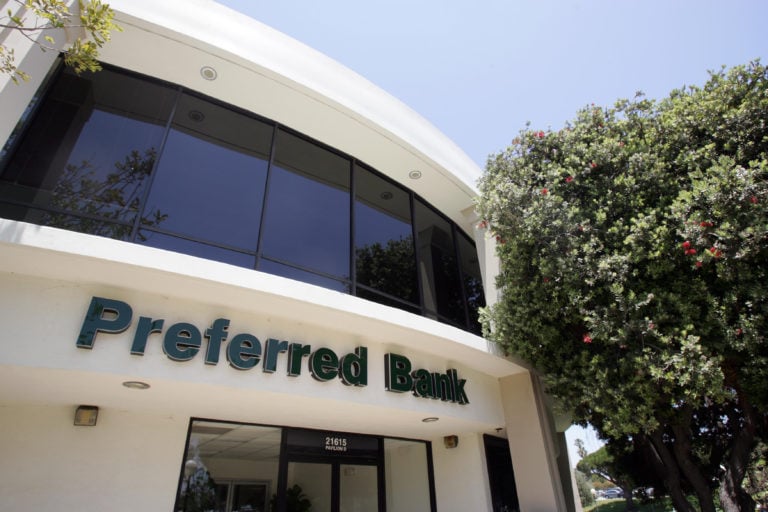
Preferred Bank, which had been struggling for months with a deteriorating loan portfolio, secured much needed capital last week with a stock sale that netted more than $70 million.
The critical move likely staved off failure for a bank thought to be on the ropes.
But the accomplishment may be a milestone for the broader L.A. banking industry. After recent capital-raising efforts at other troubled institutions, including Hanmi Bank and Saehan Bank, analysts say the local industry no longer has any large institutions in danger of being seized by regulators.
That’s significant for Los Angeles, where the banking sector was among the most severely whacked during the recession.
“The problems aren’t over by any means, but certainly they are a lot better, and some of the worst institutions have already failed,” said James Barth, a senior fellow at the Milken Institute in Santa Monica.
Some tiny local banks remain troubled, but all of L.A.’s banks and thrifts with at least $500 million in assets are now well-capitalized by regulatory standards, pending the completion of the recently announced financing transactions.
Those capital cushions can help guard against future loan losses, and with nascent signs of recovery in the economy, analysts are increasingly optimistic that the prospect of failure is off the table for the vast majority of L.A.’s banks.
“We had Countrywide and IndyMac, obviously, and we had lots of others” who did not survive the recession, Barth said. “What’s left in the California market is relatively smaller, less troubled institutions.”
For Preferred Bank, a nine-branch institution catering to the Chinese-American community, problems emerged in 2009 after regulators expressed deep concerns about the bank’s asset quality, particularly its construction loan portfolio.
In March, Preferred entered into a consent order with regulators directing the bank to boost its capital levels. Regulatory enforcement orders can be deadly for institutions because they highlight a bank’s deteriorating conditions, which can scare away potential investors.
To raise capital, Preferred reached out to institutional investors and tapped into its ties within the local Chinese-American community, with directors making personal appeals to friends and associates. The effort paid off: Preferred raised $77 million through a direct stock offering, up from original projections of $70 million.
The move, which boosted the bank’s capital to more than $160 million, was critical to the bank’s survival.
“Survivability is no longer the question for Preferred; now it is a question of earnings power,” said Julianna Balicka, an analyst with New York’s Keefe Bruyette & Woods Inc. who follows several local banks.
Foreign ownership
The capital raise is a promising sign for the industry, coming just a month after another troubled local bank also managed to secure vital capital.
In May, Hanmi announced that Woori Finance Holdings Co., a South Korean financial conglomerate, had agreed to purchase at least $210 million of Hanmi’s stock, giving the foreign company majority ownership of the local bank. Hanmi also said it planned a $120 million stock offering to existing shareholders.
The announcement was a boon for Hanmi, which said in a Securities and Exchange Commission filing prior to the announcement that its inability to raise capital had brought into question its survival prospects.
Analysts stress, however, that the deal is far from done. Since it would effectively cede control of a U.S. bank to a foreign company, it requires regulatory approval, which can be difficult to obtain. Last year, for instance, United Commercial Bank in Northern California failed after a deal to sell itself to a Chinese company was reportedly denied by regulators.
A source at Hanmi, who asked not to be named because the bank is still awaiting approval, said Woori has submitted all necessary filings to regulatory authorities, but it could take some time before decisions are made.
“We don’t know the exact time, but to my understanding it could take from two to up to four months,” he said.
Balicka is less optimistic. She said she has no idea how long it could take, but similar efforts have taken an “extremely long time” to be resolved. “It’s a lot of approvals to get through,” she said.
Still, the recent deals leave the L.A. banking industry in much better shape than it was just a few months ago.
The industry has endured heavy loan losses throughout the recession leading to major failures. Two of the biggest casualties of the housing bust were local: Countrywide Financial was sold at a fire-sale price to Bank of America and IndyMac Bank was closed by regulators in 2008. Subsequently, a number of local multibillion-dollar-asset banks went under, including California National Bank and First Federal Bank of California.
At the beginning of 2010, a handful of local institutions were still operating under regulatory enforcement orders and verging on failure, including First Regional Bank, Saehan and Hanmi.
First Regional was closed by regulators in late January, while sources in the Korean-American banking community expected similar fates for the other banks.
In March, however, Saehan surprised many local observers when it announced a $61 million stock sale, helping the bank to get back on its feet. Meanwhile, Preferred’s similar accomplishment is being cheered within the bank.
“It’s the single most significant event for the bank since we went public back in February of 2005,” said Edward Czajka, the bank’s chief financial officer.
“We’re still going to be very thoughtful in how we approach that,” Czajka said, “but this does allow us to move off some assets maybe a little quicker than we otherwise would have.”
